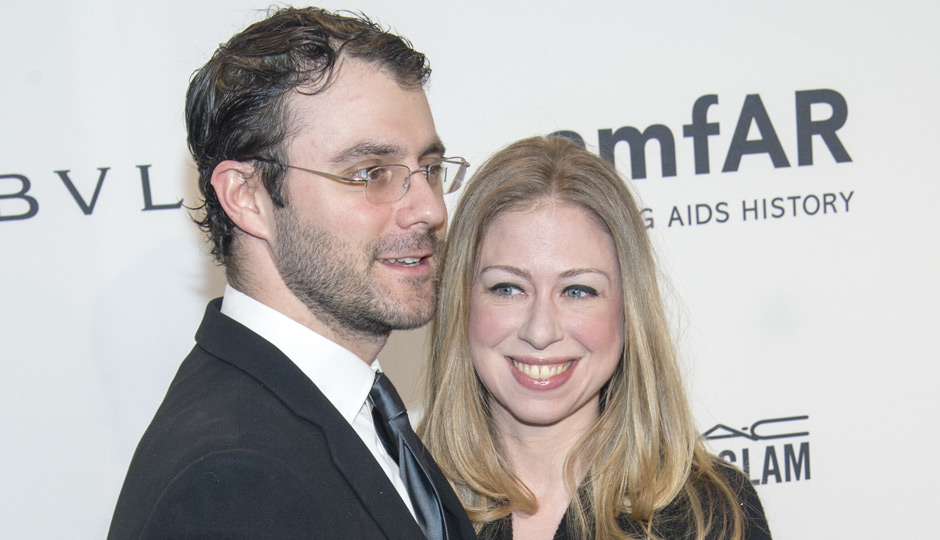What’s Weird About Chelsea Clinton’s Baby

Marc Mezvinsky and Chelsea Clinton attend the 2014 amfAR New York Gala at Cipriani Wall Street on February 5, 2014, in New York City. Photo | Debby Wong, Shutterstock.com
A great big mazel tov to Chelsea Clinton and Marc Mezvinsky, who announced late last week the impending birth this autumn of an heir to the Clinton dynasty. You may remember their wedding back in the summer of 2010. It was the American equivalent of one of Britain’s royal marriage hullabaloos, and cost, cognoscenti guessed, about three million bucks. But for all its heritage and privilege, Marc and Chelsea’s baby, when it’s born, will be part of a minority — the less than 50 percent of all babies born in this country today whose parents are wed.
There’s a TLC reality show that my daughter Marcy watches sometimes, called Say Yes to the Dress. It follows a standardized format: Three brides arrive at a bridal shop with entourages — mothers, in-laws, bridesmaids, best friends — describe to a salesperson their planned weddings and their fiancés, then try on a series of wedding gowns in hopes of finding The One. This decision is played up as truly momentous — as though the bride’s future happiness depends as much on what she’ll wear for her Big Day as on whom she’ll wed. There’s another show, Something Borrowed, Something New, in which each week a bride-to-be has to decide between a new bridal gown she chooses herself, or her mom’s old gown, albeit in a new, designer-gussied-up version. Marcy likes that show, too.
The typical American wedding now clocks in at $30,000. That’s well over half a typical household’s median income in 2013. And that doesn’t even include all the costs. Marcy was recently invited to be in a friend’s wedding. Her bridesmaid’s dress rang up at several hundred dollars. Her shoes were a hundred more. For the bachelorette party, the bride and her ’maids are flying to Las Vegas. The wedding’s in October. In March, Marcy cut her hair, and the bride chewed her out, saying she should have asked for permission first.
My point is, weddings have become a BFD, culturally and economically. And yet they’re getting rarer and rarer. In a recent Harris poll, 54 percent of millennials said marriage isn’t necessary. More than half the babies of women under age 30 are born out of wedlock. (There’s a quaint old term.)
Why, if marriage doesn’t matter to millennials, does it play such a large role culturally? Why the nonstop coverage of the royal ceremony of Kate and William? Why does the Inquirer run its nuptial-celebrating “Love” column every week? Why are bakeries and charities and florists and dressmakers and jewelers and stationers and even Groupon getting into the wedding game? Why so much attention paid to entering matrimony when it’s a state young people say they don’t much care whether they achieve?
The answer that University of Pennsylvania sociologist Frank Furstenberg gave the New York Times is pretty depressing: “Marriage has become a luxury good.” It’s in a class with Mercedes cars and Prada clothes and Hermès bags and Dom Perignon. The fuss over weddings is aspirational; Marcy and her friends watch young women dither between $5,000 dresses for the same reason they watch their Real Housewives older sisters bitch at one another over brunch — because it’s a life that, because of economic, sociological, and emotional woes, they’re not likely to have.
Some people think this isn’t a bad thing. We’re living so long now, they argue, that we should think of our lives in stages, and change up partners in accordance with our changing needs. It’s odd that heterosexuals should become so blasé about the institution of marriage just as the gay community is finally claiming it as a right. (Say Yes to the Dress has featured several gay couples in the past few years.) Opponents of gay marriage argue that same-sex unions somehow devalue “the real thing.” Seems to me they do just the opposite. If young hetero couples’ main impetus for marriage is so they can have a big expensive party, get lots of attention, and post a bunch of photos on social media, conservatives should rejoice that there are still people who long simply to be united with a single partner for all time.
The Atlantic has run an interesting series of back-and-forth debates on the subject of gay marriage recently. One contributor, Adam Hersh, had this to say on the subject: “The fight for gay marriage is a fight to be recognized as a normal member of society.” That’s the same impetus that drives women, racial and sexual minorities, the mentally ill, the disabled, and all the other “others” in their battles for recognition and equality. Those battles may become easier now that the so-called “normal members” of society don’t much care about being recognized as such anymore. Meantime, poor Hillary Clinton has to deal with a bunch of folks who’re worrying that becoming a grandma will derail her plans for total world dominance. Plus ça change, plus c’est la même chose.
Follow @SandyHingston on Twitter.


